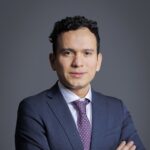Atlantic Fellows for Health Equity brings together health professionals from around the world and across disciplines to build leaders, combat disparities and create community. Its mission is to develop global leaders who not only understand the roots of health inequities but also have the skills and courage to create more equitable organizations and communities.
Each year, fellows share their reflections through Equity Talks — short presentations that highlight their leadership journey and learning during the fellowship. We are proud to bring some of these insights to the BMJ Leader Blog audience.
The blog below was written by Mario Jimenez, a 2024 Atlantic Fellow for Health Equity.
To watch the recording of this talk, click here
In today’s health landscape, where public trust is increasingly fragile and misinformation can easily derail well-planned efforts, leadership in immunization demands more than strategic plans. It requires proximity to the communities we serve, cultural awareness and openness to dialogue. As a public health practitioner working in infectious disease prevention, I’ve come to see that the real enablers of vaccine access are not only systems and funding, but the relationships that allow those systems to function.
Growing up in Colombia, I believed leadership was for those with polished resumes, fluent English, and influential networks. None of which I had. What I did have was curiosity, persistence, and a commitment to fairness. My early perception of leadership, deeply shaped by societal expectations, made me question whether I belonged in a space where meaningful change could happen. Over time, I’ve learned that effective leadership in global health is not about fitting a predefined mold. It’s about authenticity, courage, and empathy. It’s about staying close to people’s realities and delivering tangible results.
The recent backlash against vaccines highlights why this kind of leadership matters now more than ever. Anti-vaccine rhetoric, often amplified by misinformation, fear, and political opportunism, undermines decades of immunization progress. But behind vaccine hesitancy often lie deeper concerns: political exclusion, economic inequality, and a lack of responsive systems. Leadership in this context isn’t about defending a narrative, it’s about building space for honest, responsive dialogue that addresses people’s lived experiences.
Becoming a father transformed my perspective. My son Aman brought immense joy, but also a sense of vulnerability, a feeling shared by parents everywhere. When he became ill, the ease of accessing care in Switzerland made me think of how many families—whether in Colombia, Mozambique, or Burundi, face far greater barriers to that same peace of mind. These moments clarified what’s at stake in our work: ensuring that no child is left unprotected simply because of where they were born.
This deeply personal experience strengthened my empathy for parents who, due to systemic inequities, struggle to access life-saving vaccines and quality care. It also reinforced the injustice of vaccine hesitancy in high-income countries where vaccines are available, sometimes taken for granted, while many in low-income settings desperately seek them.
My professional journey working in immunization has only deepened this understanding. During a visit to Pakistan, I realized my role wasn’t just administrative, it was translational. Our strategies developed in Geneva only mattered if they made sense to health workers in rural clinics. The challenge was not only to design effective policies but to translate complex guidance into meaningful and practical terms for frontline health providers.
In Burundi, I met Odile, a community health worker walking for hours each day to reach families, without basic tools or reliable compensation. Her resilience was a powerful reminder that policies don’t deliver vaccines, people do. And they need more than encouragement; they need advocacy, resources, and recognition.
It’s in moments like these that the essence of leadership becomes clear. Authentic leadership in the vaccination space means stepping up when systems fall short, engaging with clarity and compassion. It means personalizing public health messages so they resonate with each community’s context. When we lead authentically, our credibility deepens, and we become more effective in addressing the roots of mistrust.
To build trust in vaccines, we also need to build trust in the systems behind them. Data alone won’t repair the damage of past exclusions. What does make a difference is presence, being there consistently, listening well, acknowledging local realities and of course, action. Silence in the face of disinformation or dismissing people’s concerns only deepens mistrust. And in a world where misinformation spreads quickly, neutrality can become complicity.
During my time with the Atlantic Fellows for Health Equity, I met many leaders who redefined what leadership looked like. They didn’t lead from above but from within. They asked questions rather than giving directives, adjusted to local needs, and made themselves accountable to the people they served. These experiences showed me that leadership doesn’t have to be loud to be transformative, it must be rooted, inclusive, and humble.
Ultimately, the leadership required in this era of vaccine skepticism must connect deeply and personally with communities, respect cultural differences, and remain committed to bridging divides. We also need to shift how we define success. It’s not just about doses delivered or timelines met. It’s about whether we helped build systems that reflect the values of the people they serve. Did we strengthen trust? Did we respond to community aspirations? Did we help restore confidence where it had been lost?
If we want sustainable immunization coverage, we must stay grounded, not in slogans or optimism alone, but in the everyday work of showing up, acknowledging complexity, and standing with those who make vaccine delivery possible. This kind of leadership isn’t always visible, but it’s what makes the system work, and what can help it thrive in the face of future challenges.
Author

Mario Jimenez is a health economist working to increase access to immunization in low-income countries. He is a Senior Atlantic Fellow for Health Equity.
Declaration of interests
I have read and understood the BMJ Group policy on declaration of interests and declare the following interests: none.